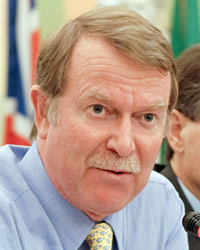Istanbul '09 Workshop
NATO’s New Strategic Concept
Ambassador Stewart Eldon
Permanent Representative of the United Kingdom on the North Atlantic Council
THE NEW STRATEGIC CONCEPT
I thought I would say a few words about a very big item on the NATO agenda this year: the new Strategic Concept. As you know, the Strategic Concept is in essence NATO’s mission statement, or, in military speak, its strategic directive. The present Strategic Concept was agreed to in 1999. The great majority of it remains valid, and highly relevant. But some of its aspects, in particular, NATO’s approach to new threats and challenges such as cyberattacks and energy security and how it should relate to other international organizations (the Comprehensive Approach), manifestly need updating. There is also an increasing feeling, which came through quite strongly at the Strasbourg / Kehl Summit, that more work is necessary to explain to Allied publics—indeed to the wider world—what NATO is and what it does. Too many people still think in terms of Cold War stereotypes. A new Strategic Concept, written in the right way, would be an excellent way of doing that.
At Strasbourg, heads of state and government adopted a declaration on Alliance security, which can essentially be seen as the foreword to the new Strategic Concept. It is only one page and a half long, and I hope you will read it. Unlike many NATO documents, it was not drafted line by line, but rather through a process of iterative discussion between the Secretary General and ambassadors. It contains some important points:
- A reaffirmation of NATO’s place as the essential transatlantic forum for security consultations among Allies. I sense that, particularly following the advent of the new U.S. administration, the consultation element is becoming more important for many Allies.
- Confirmation that Article 5 of the Washington Treaty remains the cornerstone of the Alliance. This is coupled with a determination to strengthen NATO’s capacity to play an important role in crisis management and conflict resolution wherever its interests are involved.
- An important reference to strengthening NATO’s cooperation with other international actors, including the U.N., EU, OSCE, and African Union, combined with recognition of the importance of a stronger and more capable European defense and determination to ensure that the NATO-EU relationship is a truly functioning strategic partnership.
- Important language on new threats, including, for the first time, climate change.
The declaration concludes by tasking the Secretary General with developing a new Strategic Concept and submitting proposals for its implementation and approval at the 2010 Summit in Lisbon. The Heads of state and government asked him to convene and lead a broad-based group of experts to help him do this, and to keep the Council in permanent session involved throughout the process. The Heads drafted this language themselves with the aim of avoiding a lowest-common- denominator approach to the Strategic Concept and to producing a document that will make a real difference.
KEY POINTS
Work on the new Strategic Concept will have to cover some important and fundamental issues. I will not go into them all now, but I will just give a flavor of what I think will be some of the key points. These include:
- The right balance between the effort and the resources devoted to collective defense and expeditionary activity. The truth is that in this day and age, when the classic military threat to Alliance territory is negligible, broadly the same capabilities are needed to do both things.
- How to deal with the new threats and challenges, many of which are not NATO’s prime responsibility. Could a cyberattack, for example, ever escalate to an Article 5 scenario?
- Linked to this is how NATO should relate to other international organizations, in particular to the EU. The fact that we are meeting in the glorious city of Istanbul should remind us that this is not straightforward.
- Finally, how do we manage the balance between our level of ambition and the resources available to fulfill it at a time of global economic difficulty? This has fundamental implications for capability development, including avoiding overlap between the work underway in NATO and in the European Defense Agency.
All of that will, in all honesty, give us more than enough to go with.

